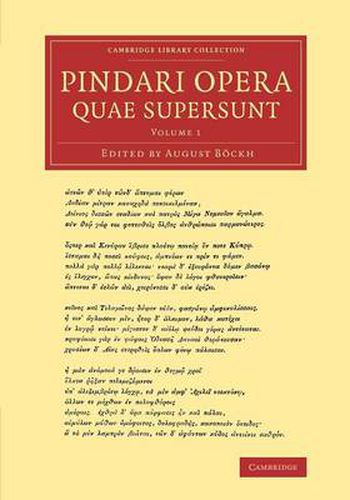Readings Newsletter
Become a Readings Member to make your shopping experience even easier.
Sign in or sign up for free!
You’re not far away from qualifying for FREE standard shipping within Australia
You’ve qualified for FREE standard shipping within Australia
The cart is loading…






One of the foremost scholars of his day, the German classicist August Boeckh (1785-1867) was chosen by the Berlin Academy of Sciences as the first editor of the monumental Corpus inscriptionum graecarum. Before that he had published this groundbreaking edition of the extant works of the Greek poet Pindar (c.522-c.443 BCE) in two volumes, the second being split into two parts. This first volume, published in 1811, contains the only complete surviving works of Pindar, the victory odes (Epinikia), written to celebrate athletic successes at the Olympic and other games. In addition to the editor’s Latin preface and critical notes, this volume also contains his important treatise on Pindarian metrics, De metris Pindari, in which he establishes a close connection between Greek music and verse, elucidating the Greeks’ own statements about rhythm and providing a systematic basis for the study of Greek verse.
$9.00 standard shipping within Australia
FREE standard shipping within Australia for orders over $100.00
Express & International shipping calculated at checkout
One of the foremost scholars of his day, the German classicist August Boeckh (1785-1867) was chosen by the Berlin Academy of Sciences as the first editor of the monumental Corpus inscriptionum graecarum. Before that he had published this groundbreaking edition of the extant works of the Greek poet Pindar (c.522-c.443 BCE) in two volumes, the second being split into two parts. This first volume, published in 1811, contains the only complete surviving works of Pindar, the victory odes (Epinikia), written to celebrate athletic successes at the Olympic and other games. In addition to the editor’s Latin preface and critical notes, this volume also contains his important treatise on Pindarian metrics, De metris Pindari, in which he establishes a close connection between Greek music and verse, elucidating the Greeks’ own statements about rhythm and providing a systematic basis for the study of Greek verse.